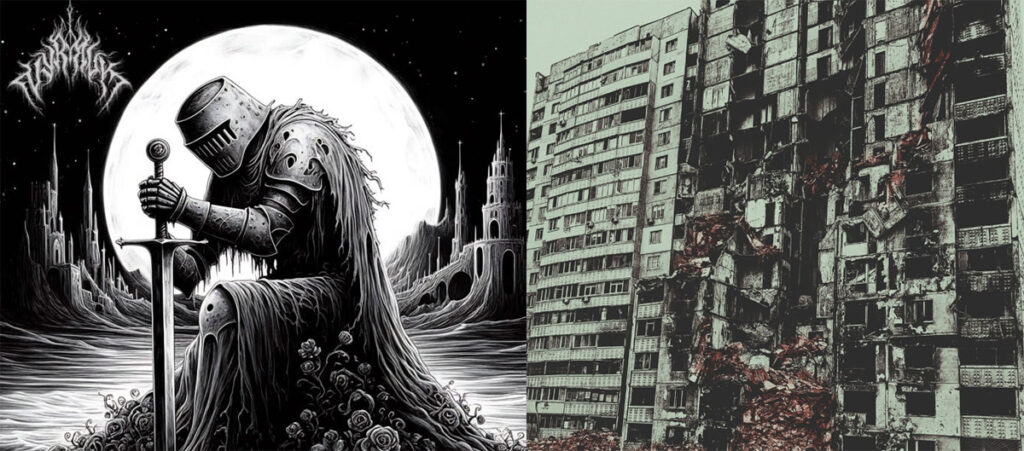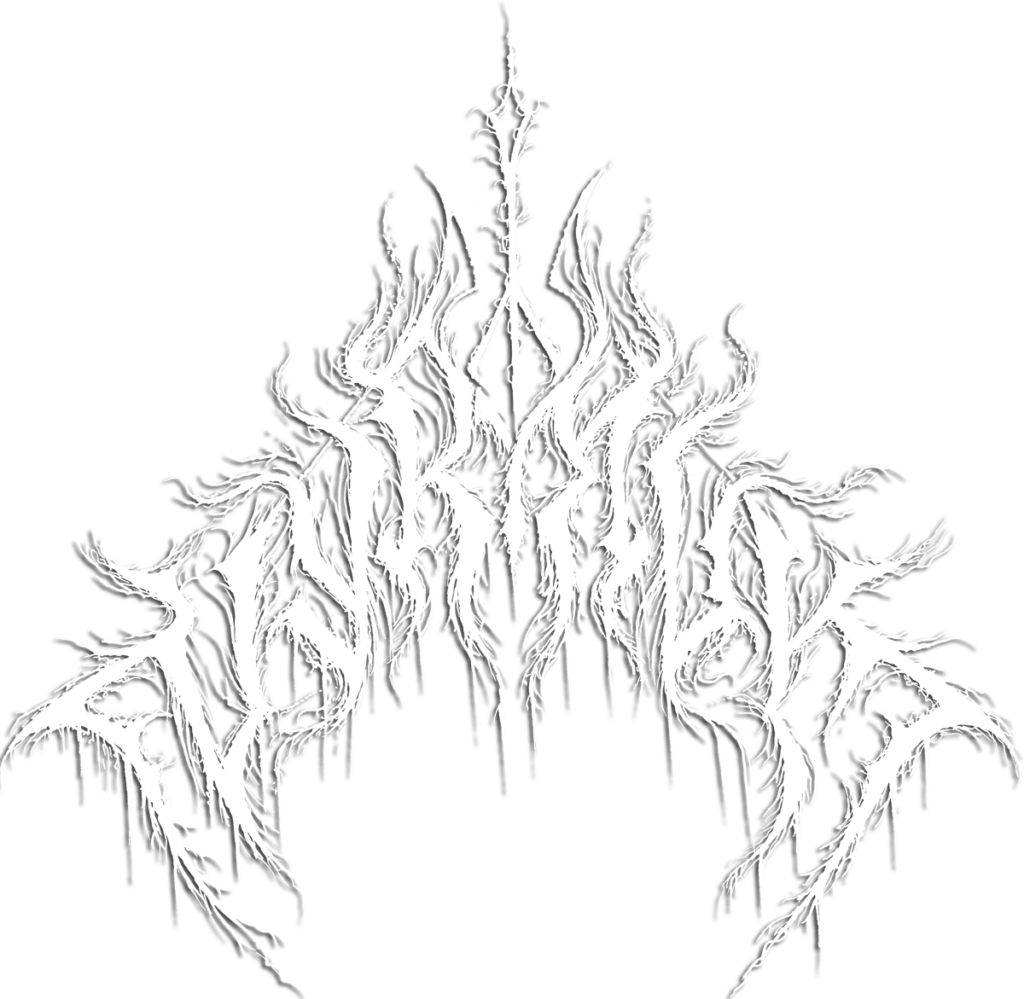

Naším dnešným hosťom je talentovaný hudobník z Charkova na Ukrajine. Volá sa Vlad Blizniuk a rád by sa podelil o príbeh svojej kapely, vlastne one-man projektu s názvom Vyr Muk. Ak vás zaujíma, čo sa skrýva za týmto zaujímavým názvom, prečítajte si náš najnovší rozhovor.
Ahoj Vlad, rada ťa spoznávam. Ako sa máš?
Ahoj, aj mňa teší. Mám sa dobre, ďakujem za opýtanie. A chcem sa ti poďakovať, že si ma vybrala na tento rozhovor.
Som veľmi rada, že môžem zdieľať tvoj projekt s našimi čitateľmi. Takže na úvod, skús sa predstaviť, aj tvoju kapelu a možno aj tvoje hudobné vízie…
Aj ja som rád, že môžem čitateľom povedať o mojom projekte. Volám sa Vlad Blizniuk a Vyr Muk je môj projekt, v ktorom som momentálne jediný člen. Vyr Muk vznikol v Charkove na Ukrajine v decembri 2023, takže funguje už niečo vyše roka. Väčšinou píšem hudbu v štýle black/death metal s prvkami ambientu a symfonických nástrojov, ale mám aj EP v štýle ambient piano a cinematic dungeon synth.
Čo ťa inšpirovalo k vytvoreniu Vyr Muk a k výberu fúzie black/death metalu a ambientu pre tvoju hudbu?
Najväčšou inšpiráciou pre mňa boli a sú tragické udalosti, ktoré sa dejú v mojej krajine. Hudba, ktorú píšem, je odrazom môjho duševného stavu kvôli tomu, čo sa deje okolo mňa, s mojimi príbuznými, priateľmi a ľuďmi na Ukrajine. Myslím si, že black/death metal je najlepší žáner na vyjadrenie svojich pocitov a skúseností, pretože takáto temná a extrémna hudba je veľmi vhodná pre témy, ktorých sa dotýkam vo svojich skladbách.
Máš nové EP, takže mám, samozrejme, pár otázok aj k nemu. EP sa zameriava na hrôzy vojny na Ukrajine.
Áno, každá skladba okrem inštrumentálneho intra je venovaná rôznym aspektom a hrôzam vojny.
„In the Captivity of Suffering“ sa ponára do fyzickej a psychickej úzkosti. Môžeš sa podeliť o viac informácií o tvorivom procese, ktorý stál za hudobným vyjadrením týchto intenzívnych emócií?
„In the Captivity of Suffering“ je skladba, ktorá poslucháčovi rozpráva o mukách zajatia. Jej texty sa ponárajú do tém fyzického a psychického mučenia. Zakaždým, keď sa naši ľudia vracajú zo zajatia, je ťažké nerozplakať sa, už len pri pohľade na ich výzor, všetko je to napísané na ich telách. Keď počujete príbehy ľudí, ktorí sa dostali zo zajatia v rozhovore, zdá sa to nepredstaviteľné, ale pravdou je, že sú skutočné. Neľudské podmienky, v ktorých sú umiestnení, všetky fyzické a psychické mučenia, ktorými prechádzajú… je ťažké uveriť, že takéto veci ešte existujú v 21. storočí. A žiadna z medzinárodných organizácií a/alebo krajín nemôže ovplyvniť Rusov, aby dodržiavali pravidlá medzinárodného práva, vrátane práv vojnových zajatcov.
„Kaleidoscope of Horror“ vykresľuje pochmúrny obraz zničeného mesta. Aké obrazy alebo konkrétne udalosti si použil na vytvorenie tejto atmosféry?
„Kaleidoscope of Horror“ opisuje strach a utrpenie ľudí, ktorí žijú v mestách, ktoré sú 24 hodín denne ostreľované delostrelectvom, raketami, leteckými bombami, čo vedie k úplnému zničeniu mesta a ľudí, ktorí tam žili. Prvá myšlienka, ktorá mi napadla, keď som sa rozhodol napísať túto pieseň, súvisela s tragédiou Mariupolu, ale v skutočnosti už existujú stovky, ak nie tisíce miest a dedín na Ukrajine, ktoré sú úplne zničené útočníkmi. Stávajú sa mestami duchov.
„Dead Forest“ prezentuje silné posolstvo o odolnosti prírody. Ako si vyvážil agresívne prvky black/death metalu s témou znovuzrodenia a regenerácie?
Toto posolstvo sa dá prečítať priamo z textu. Hovorí sa v ňom, že v tele a krvi útočníkov sa les, teda príroda, obnoví, aj keď je teraz nimi zničený. Obsahuje aj posolstvo, že korene si budú dlho pamätať nenávisť a táto spomienka bude putovať ďaleko do budúcnosti.
Kontrast medzi ambientným introm a tvrdšími skladbami je výrazný. Aký bol zámer za týmto dynamickým posunom v tvojom zvuku?
Spočiatku tam nebol žiadny zámer, pretože inštrumentálne intro bolo napísané ako posledné zo všetkých skladieb. Potom mi však napadla táto myšlienka a išlo to akosi pokojne, ale s emocionálne temnými časťami, takže som sa rozhodol zahrnúť ju aj na album.
Ako hudobníka z Charkova, ako vojna ovplyvnila tvoju umeleckú víziu a tvorivý proces?
Povedal by som, že dosť výrazne. V tejto chvíli žijem 10 km od frontovej línie, takže je to asi 5-10 minút jazdy autom. Nepamätám si deň, kedy by som nepočul výbuch. Mám aj príbuzných a priateľov, ktorí sa aktívne zúčastňujú na obrane našej krajiny, takže vojna je okolo mňa 24 hodín denne, aj keď nie som vojak.
Aké posolstvo si želáš, aby si poslucháči odniesli z „Shadows Falling on Dead Cities“? Aké sú tvoje hudobné vplyvy pre Vyr Muk?
Posolstvo, ktoré môže poslucháč počuť z „Shadows Falling on Dead Cities“, sa môže líšiť, pretože každý človek má svoju vlastnú skúsenosť, mentalitu, uhol pohľadu. Z mojej strany tam nie sú žiadne skryté posolstvá, toto je len opis katastrofy zvanej „vojna“ z uhla pohľadu, ktorý vidím ja. Vo vojne nie je nič dobré, pozitívne ani epické. Hudba Vyr Muk je najviac ovplyvnená kapelami ako 1914, Behemoth a Dimmu Borgir. V súčasnosti počúvam veľa ukrajinských kapiel, ktoré sú viac-menej populárne, vždy je zaujímavé objaviť pre seba nejakú novú hudbu.
Aké sú tvoje plány?
V tejto chvíli pracujem na budúcom albume, bude tiež agresívny a temný. Dúfam, že ho budem môcť vydať ako LP počas roka 2025, ale uvidíme, ako sa veci vyvinú. Pripravuje sa aj pripravovaný cover song so skvelou kapelou z Nemecka s názvom Winds of Winter.
Blížime sa ku koncu. Chcel by si niečo povedať našim čitateľom?
Chcem sa poďakovať všetkým, ktorí prejavili záujem o tento rozhovor a venovali svoj čas jeho čítaniu a dúfam, že sa vám páčil a našli ste si v ňom niečo nové. Od momentu, keď som začal tento projekt, som stretol veľa úžasných ľudí z Ukrajiny aj zo zahraničia a dúfam, že toto číslo neprestane rásť.
Chcem sa ti poďakovať za tento rozhovor a prajem všetko najlepšie!
Ja ďakujem a prajem všetko dobré!
Our today’s guest is a very talented musician from Kharkiv, Ukraine. His name is Vlad Blizniuk who would like to share the story of his band, actually a one man project called Vyr Muk. If you´re interested in knowing what´s there behind this interesting name, read our newest interview.
Hello Vlad, nice to meet you. How are you?
Hello, nice to meet you too. I`m ok, thanks for asking. And I want to thank you for taking me on for this interview.
I am really excited to share your project with our readers. So to start with, try to introduce you, your band and your musical visions perhaps…
I’m also excited to tell the readers about my project. My name is Vlad Blizniuk and Vyr Muk is my project and I am the only member at this moment. Vyr Muk originated in Kharkiv, Ukraine in December 2023, so for now it’s been a little bit more than a year to exist. Mostly I write music in the style of black/death metal with some notes of ambience and symphonic instruments as well, but I also have EP’s in the style of ambient piano and cinematic dungeon synth.
What inspired you to create Vyr Muk and choose the black/death metal and ambient fusion for your music?
The biggest inspiration for me were and are tragic things that are happening in my country. The music I write is the reflection of my mental state to what is happening around me, with my relatives, friends and people of Ukraine. I think black/death metal is the best genre to expose your feelings and experience because such dark and extreme music is very suitable for topics that I touch in my songs.
You have a new EP out, so I have a few questions about it, of course. The EP focuses on the horrors of war in Ukraine.
Yes, each song besides the instrumental intro is dedicated to different aspects and horrors of war.
„In the Captivity of Suffering“ delves into physical and mental anguish. Can you share more about the creative process behind conveying these intense emotions musically?
„In the Captivity of Suffering“ is a song that tells the listener about the captivity’s torment. Its lyrics dive into themes of physical and mental torments. Every time our people come from captivity it’s hard not to burst in tears even just looking at their appearance, it’s all written on their bodies. When you hear stories of people who came out of captivity on the interview it just seems unimaginable but the truth is that they are real. The inhuman conditions they are placed in, all physical and mental tortures that they go through… it’s hard to believe such things still exist in the 21st century. And none of the international organizations and/or countries can influence Russians to follow the rules of international law, including rights of prisoners of war.
„Kaleidoscope of Horror“ paints a bleak picture of a ruined city. What imagery or specific events did you draw upon to create this atmosphere?
“ Kaleidoscope of Horror“ describes fear and suffering of people that live in the cities that are shelled by artillery, rockets, air bombs 24/7 and that results in total destruction of the city and people that lived there. The first thought that came to my mind when I decided to write this song was connected to the tragedy of Mariupol, but in fact there are already hundreds if not thousands of cities and villages in Ukraine that are completely destroyed by the invaders. They are becoming ghost cities.
„Dead Forest“ presents a powerful message about nature’s resilience. How did you balance the aggressive elements of black/death metal with the theme of rebirth and regeneration?
This message can be read directly from the text. It says that in the flesh and blood of the invaders the forest, aka nature, will renew itself after, even if for now it is destroyed by them. Also it contains the message that roots will remember the hate for a long time and this memory will travel long into the future.
The contrast between the ambient intro and the heavier tracks is striking. What was the intention behind this dynamic shift in sound?
At first there was no intention because the instrumental intro was written the very last from all the songs. But then this idea came to my mind and it went up kinda calmly but with emotionally dark parts so I decided to include it into the release from the contrast shocking perspective.
As a musician from Kharkiv, how has the war directly impacted your artistic vision and creative process?
I would say pretty much. At this moment I live 10 km from the frontline, so it is like 5- 10 minutes’ drive by car. I can’t remember a day I didn’t hear an explosion. Also I have my relatives and friends who actively take part in the defense of our country so the war is around me 24/7 even though I am not a soldier.
What message do you hope listeners take away from „Shadows falling on dead cities“? What are your influences, musically-speaking, for Vyr Muk?
The message the listener can hear from „Shadows falling on dead cities“ can vary because each person has its own experience, mentality, point of view. From my side there are no hidden messages, this is just a description of the disaster called „war“ from the point of view I see. There is nothing good, positive or epic in the war. The music of Vyr Muk itself is mostly influenced by such bands as 1914, Behemoth and Dimmu Borgir. Nowadays I listen to lots of Ukrainian bands that are more or less popular, it’s always interesting to open some new music for myself.
What are your plans for future releases and projects?
At this moment I’m working on the future release, it will also be aggressive and dark. I hope I will be able to release it as an LP during 2025, but we shall see how things will go. There is also an upcoming cover song with the great band from Germany called Winds of Winter.
We are coming to an end. Is there anything you would like to tell our readers?
I want to thank everyone who showed interest in this interview and dedicated their time to reading it and I hope you enjoyed it and found something new for yourself. From the moment I started this project I met lots of wonderful people from Ukraine and abroad and I hope this number will not stop growing.
I want to thank you for this interview and wish all the best!
Thank you for having me here, best wishes!




